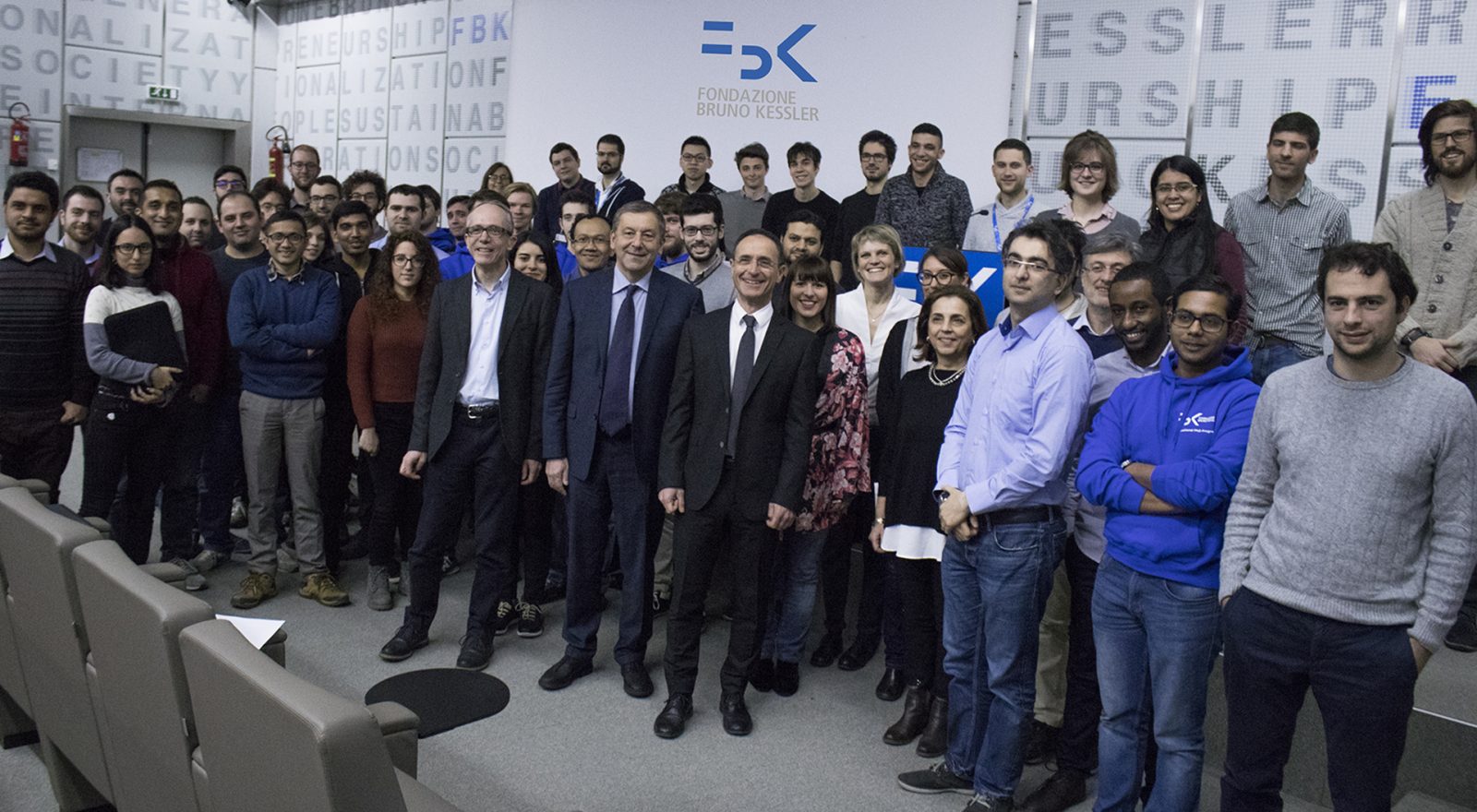PhD Day at FBK today
Led by director Paolo Tonella, the program for PhD students is run in collaboration with a wide network of Italian and international universities and involves over one hundred students from all over the world.
They average 29 years and come from 29 countries. The students enrolled in the FBK international doctoral program, to whom Fondazione Bruno Kessler dedicates the PhD Day event today at its Povo office (Trento) are more than one hundred.
The event kicked off with an introduction by Paolo Tonella (FBK), director of the “FBK International PhD Program” project, run in collaboration with a wide network of universities both Italian (Trento, Padua, Bologna, Consorzio Firenze-Pisa- Siena, Genoa, Udine, Pavia, Brescia) and international (University College London, Massachusetts Institute of Technology, Queen Mary University Imperial College London, University of Luxembourg, TU Wien, Skolkovo Institute of Science and Technology – Skolktech of Moscow).
After the talk by Elena Cabrio, who worked on her doctorate at FBK and is now Assistant Professor at the University of Nice, the students were addressed by Fondazione Bruno Kessler’s President, Francesco Profumo. “The contribution of PhD students to FBK research activities is critical”, Profumo pointed out, “and the Foundation encourages their particularly innovative ideas. There are currently 128 PhD students from all over the world who are part of the FBK doctoral program and our goal is to reach the highest levels of excellence”.
At the end of the works, a special moment will be dedicated to Mirco Ravanelli, awarded as the best doctoral student for the thesis: “Deep Learning for Distant Speech Recognition”, an area in which he had also been recognized among the best works by PhD students at the ICASSP 2017 international conference in New Orleans (USA). “I’ve always been very fascinated by the idea of building machines that can learn and this was the main reason that led me to follow a professional career linked to artificial intelligence and especially to vocal recognition”, said the researcher who for over six years worked at Fondazione Bruno Kessler and is now a post-doc researcher at Université de Montréal.
The afternoon session will be opened by a talk by Antonia Bertolino, research director at CNR Pisa, and will go on with the presentations of the students who will take their final exam in spring 2018. The works of the 3rd- and 4th-year students have been illustrated also through the exhibition of the research posters set up at our Povo premises.
“FBK International PhD Program”
Led by Director Paolo Tonella (FBK), the “FBK International PhD Program” is run in collaboration with a wide network of universities both Italian (Trento, Padua, Bologna, Firenze-Pisa-Siena, Genoa, Pavia, Brescia) and international (University College London, Queen Mary University Massachusetts Institute of Technology, Imperial College London, University of Luxembourg, TU Wien, Skolkovo Institute of Science and Technology – Skolktech in Moscow) and currently involves students of Armenia, Azerbaijan, Bangladesh, Brazil, Canada, China, Colombia, Croatia, Egypt, Ethiopia, Fiji, Germany, Greece, India, Indonesia, Iran, Iraq, Italy, Mauritius, Nigeria, Pakistan, Poland, Russia, Slovakia, Sri Lanka, Tunisia, Turkey, Ukraine, United States of America.
The PhD program takes place in the Foundation’s laboratories under the supervision of senior researchers and is recognized by an FBK certification that also highlights the achievement of excellent results, if any. For affiliated universities that join the program, the certification will be replicated in the Diploma Supplement that will be earned in addition to the PhD.
Besides the accurate selection of candidates, the quality of research will be ensured through a periodic evaluation process conducted by an internal committee composed of researchers specialized in the topic of each student. Other initiatives provided include a Research Internship, designed for final year students of the Masters Degree program, and the Alumni Association to help members of the community keep in touch.

